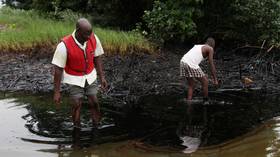Oil giant quits onshore sector in Africa’s largest economy

British energy giant Shell has announced it has reached an agreement to sell its onshore assets in Nigeria in a deal worth $2.4 billion. The company is embroiled in long-running legal battles over environmental pollution in the West African country.
According to the firm, the sale to the Renaissance group – a consortium of five companies – is intended to streamline the operations of Shell Petroleum Development Company of Nigeria Limited (SPDC).
“This agreement marks an important milestone for Shell in Nigeria... simplifying our portfolio and focusing future disciplined investment in Nigeria on our Deepwater and Integrated Gas positions,” Zoe Yujnovich, Shell’s integrated gas and upstream director, said in a statement on Tuesday.
“It is a significant moment for SPDC, whose people have built it into a high-quality business over many years. Now, after decades as a pioneer in Nigeria’s energy sector, SPDC will move to its next chapter under the ownership of an experienced, ambitious Nigerian-led consortium,” she added.
Shell has sought to exit oil production in the Niger Delta since 2021, as part of a larger withdrawal by Western energy companies from Nigeria as they reportedly focus on more profitable business operations. In recent years, Italian energy major Eni, America’s Exxon Mobil, and Norway’s Equinor have all reached agreements to sell assets in the country.
The British corporation has been operating in Africa’s largest economy for over 80 years, weathering multiple controversies and environmental disasters, having pioneered the country’s oil and gas industry in 1937.
Human rights group Amnesty International has asked the Nigerian government, which is required to approve the sale, to ensure that Shell addresses environmental damage concerns sparked by decades of oil spills in the Niger Delta region.
“For decades, oil spills have damaged the health and livelihoods of many inhabitants of the Niger Delta... Shell should not be allowed to wash its hands of the problems and leave,” Mark Dummett, Amnesty International’s director of human rights, said in a statement on X (formerly Twitter).
Thousands of locals have filed complaints, demanding compensation from the London-based energy giant for disrupting their livelihoods due to pollution from the spills. Late last year, the UK High Court ruled that more than 13,000 farmers and fishers from the oil-producing communities of Ogale and Bille can sue the company for violating their constitutional right to a clean environment.
Shell has denied responsibility, blaming most of the leaks on pipeline sabotage and illegal crude oil extraction.
On Tuesday, the oil major claimed that potential SPDC owner Renaissance – which includes ND Western, Aradel Energy, First E&P, Waltersmith, and Petrolin – will assume responsibility for spills, theft, and sabotage.













